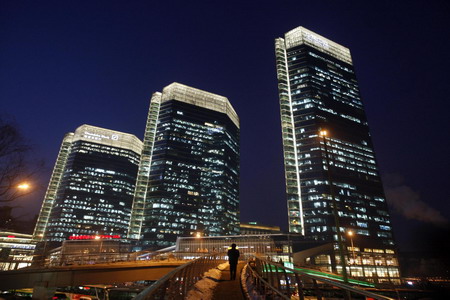
The Chinese government will likely spend the full amount of its planned stimulus in 2010, the finance minister said on Sunday, despite improvements in its economy and efforts to control bank lending.
Separately, the State Council, China's Cabinet, announced measures to curb speculation in the property market.
Finance Minister Xie Xuren's comments could help reassure companies and investors that Beijing will keep spending to shore up growth.
Xie said Beijing plans to spend 992.7 billion yuan ($145.3 billion) on public investment in 2010, Xinhua News Agency reported, including 572.2 billion yuan of stimulus funds.
The news agency gave no indication whether Xie's comments included whether the rest of the stimulus due to come from other levels of government also would be fully spent.
China's stimulus calls for pumping 4 trillion yuan ($586 billion) into the economy in 2009 and 2010 through higher spending on public works and aid to industry. Some 1.18 trillion yuan of that is coming from Beijing and the rest from local governments, state companies and lending by government-owned banks.
Xie's comments add to a string of assurances that official aid will continue, especially to private companies, which missed out on the first year of the stimulus. Most funds last year went to State-owned construction companies and suppliers of steel and cement to build airports and other public works facilities.
China's economic growth accelerated to 8.9 percent in the third quarter of 2009, which prompted some economists to say Beijing should start thinking about how to wind down its stimulus. But Premier Wen Jiabao and other officials say the recovery is still not firmly established and have warned against complacency.
The government has ordered banks to control lending following a stimulus-driven credit surge in mid-2009 and is trying to prevent over-investment in steel, cement and some other industries. That has stirred unease among some investors that Chinese leaders might be winding down the stimulus and cutting access to credit.
Meanwhile, the minister also said Beijing's central government revenues rose 11.7 percent in 2009 despite the global financial crisis.
That could help reinforce confidence that Beijing can continue stimulus spending without straining its finances. Economists say China can afford more stimulus because its debt is low compared with other major economies and tax revenues are still strong.
Xie did not give a deficit figure but said it was within the budget approved by the national legislature last March. The government projected then that it would run a deficit of 951 billion yuan ($138 billion) in 2009, equal to about 3 percent of China's $3.5 trillion economy.
The State Council, China's Cabinet, stepped up measures on Sunday to curb unauthorized investment in real estate, a move aimed at countering speculation.
Policymakers have been trying for three years to cool a boom in housing costs that they worry could ignite a backlash if the poor are priced out of the market. But credit limits and curbs meant to discourage speculation and increase the supply of low-cost housing have failed to slow price rises.
Housing prices rose 5.7 percent year-on-year in November to a 16-month high and new construction rocketed almost 200 percent, while sales nearly doubled.
"With the recovery of the real estate market, such problems as excessively rising house prices have recently emerged in some cities, which call for great attention," the State Council said in a notice.
The notice called for strengthening the monitoring of capital flow and foreign investment to prevent credit from entering the real estate sector illegally and "stop overseas speculative funds from jeopardizing China's property market."
It said families applying to buy second homes backed by loans should foot a minimum down-payment of at least 40 percent.
Governments at all levels should increase the supply of affordable homes to help resolve the housing difficulties of 15.4 million low-income households by the end of 2012, it said.